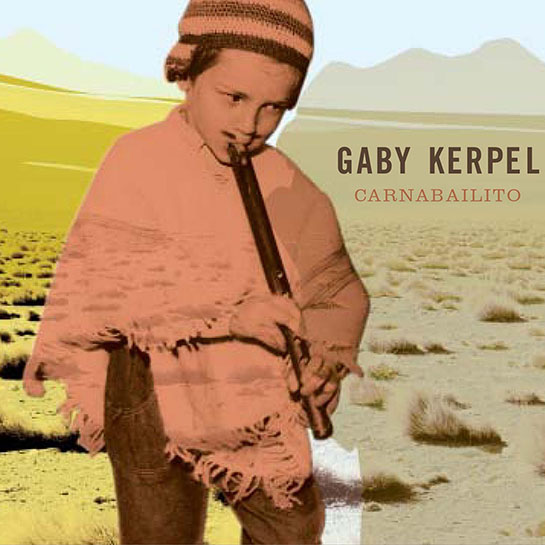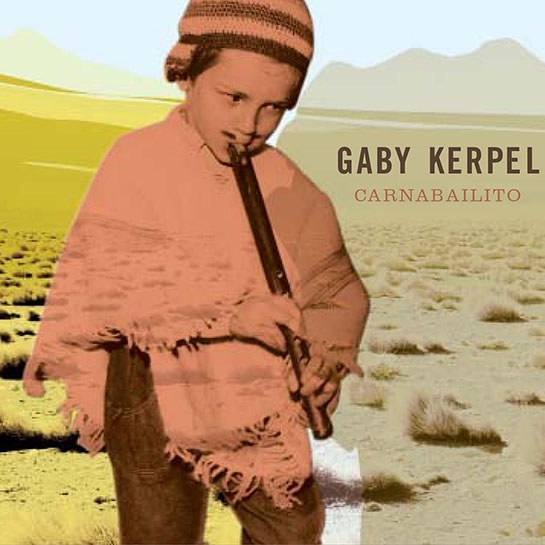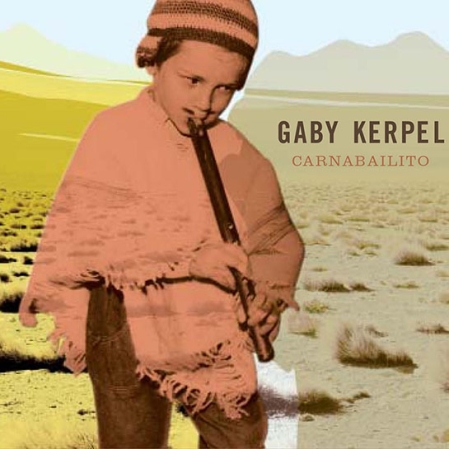Argentinean composer Kerpel, who scored the world-traveling, dance-theatre spectacle De La Guarda, makes his Nonesuch debut, and, says the Boston Globe, “melds his love of folk instruments with thoughtful electronic touches. He creates a sparse, sophisticated soundscape that begs repeated listens.”
The CD of this album is available to purchase at ArkivMusic.
“Go out and buy this record right now.” —Boston Globe
Gaby Kerpel, the Argentinean composer and musician who created the music for the long-running aerial performance-art / interactive theater spectacles of the De La Guarda troupe, made his solo debut on the Nonesuch CD Carnabailito. Like De La Guarda’s shows, the songs on Carnabailito are driven by South American percussion sounds and inspired by the instruments and folk melodies of northeastern Argentina.
Kerpel describes his electronic approach to folkloric sound as “finding a way to express my experiences by passing a vision of Argentine music through the filter of my taste.” This marriage of technology with the primitive transforms folk music into a vehicle of contemporary expression. Kerpel uses technology as a musical instrument, recording live performances on his computer and extracting the parts that he likes. Once they are digitized, he edits and transposes the samples, often manipulating them with special effects. Additionally, his music uses many types of South American traditional instruments, such as small, guitar-like Brazilian cavaquinho and Argentinean charango, as well as kalimbas and Argentinean flutes. He also incorporates children's instruments, like an accordion he played in “Herias sin Herir.” While touring with De La Guarda, he discovered instruments from other cultures, which he also used on Carnabailito, like the erhu (Chinese violin) that is featured in “Se que no vas a volver.”
Kerpel often records other musicians’ performances as well, creating samples such as the drums in “Xplicamelo,” which were taken from a recording he made of Enzo Cuenca playing different patterns with a stereo microphone (also used in “Cada vez que la visita” and “Sintenerte”). Some of the sounds heard on Carnabailito were recorded in such impromptu settings as hotel rooms. As Kerpel says, “I like to have a portable studio system so I can keep making new music while I travel. I think sometimes it is just a matter of capturing the moment.”
As a young man in Buenos Aires, Gaby Kerpel studied classical music, including piano and harmony, as well as improvisation, before realizing that traditional composition was not the road he wished to follow. In 1985, he was introduced to La Organizacion Negra, an ensemble that was creating an original type of theater that required singular music, which Kerpel created by learning to use technology as a creative tool. He composed for and performed with Negra for the next seven years while also collaborating on other dance, film, and video projects. In 1993, Negra was dissolved and two of its members formed a new group, De La Guarda, which Kerpel was asked to join. His brother, Anibal Kerpel, and Nonesuch artist Gustavo Santaolalla produced the group’s 1995 CD.
Santaolalla is the producer of Carnabailito—the third Nonesuch project with which he has been involved. He co-produced Kronos Quartet’s Nuevo, and released his own solo recording, Roncoco. Santaolalla, who has become an invaluable mentor to Kerpel, has been a force in Latin American music since the 1960s. His musical style fuses rock, soul, African rhythms, and Latin American folk. He was among a small group of musicians who created the hugely popular “Argentine Rock” movement. Santaolalla’s work as bandleader (Arco Iris, Soluna, Wet Picnic); solo artist (Santaolalla, GAS, Ronroca); and record producer (Café Tacuba, Kronos Quartet) showcase his expertise in a wide variety of other musical styles, as well.
PRODUCTION CREDITS
Produced by Gustavo Santaolalla
Associate Producer: Anibal Kerpel
Recorded at Estudio Nómade El Coyita
Additional recording at La Casa, Los Angeles, CA
String quartet (track 10) recorded at La Diosa Salvaje by Guido Nisenson
Mix Engineer: Anibal Kerpel
Mastered by Tom Baker at Precision Mastering
All samples produced and recorded by Gaby Kerpel
String arrangements by Gaby Kerpel and Sami Abadi (1), Gustavo Santaolalla and Sami Abadi (2), Sami Abadi (4) and Alejandro Terán (10)
All tracks written by Gaby Kerpel, except track 9 (version of an anonymous children’s song)
Cover design: Ponieman-Murlender
Adapted by Doyle Partners
79684
MUSICIANS
Gaby Kerpel, vocals, samples, loops
Enzo Cuenca, drums
Gustavo Santaolalla, rhythm guitar (1)
Mariana Yegros, additional vocals (1)
Mayra Bonard, additional vocals (8)
String quartet (1, 2, 4 & 10):
Javier Casalla, first violin, violin solo (1)
Katjia Lartchenko, second violin
Alejandro Terán, viola
D’mitri Rodnoi, cello



